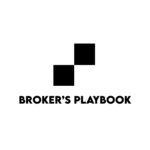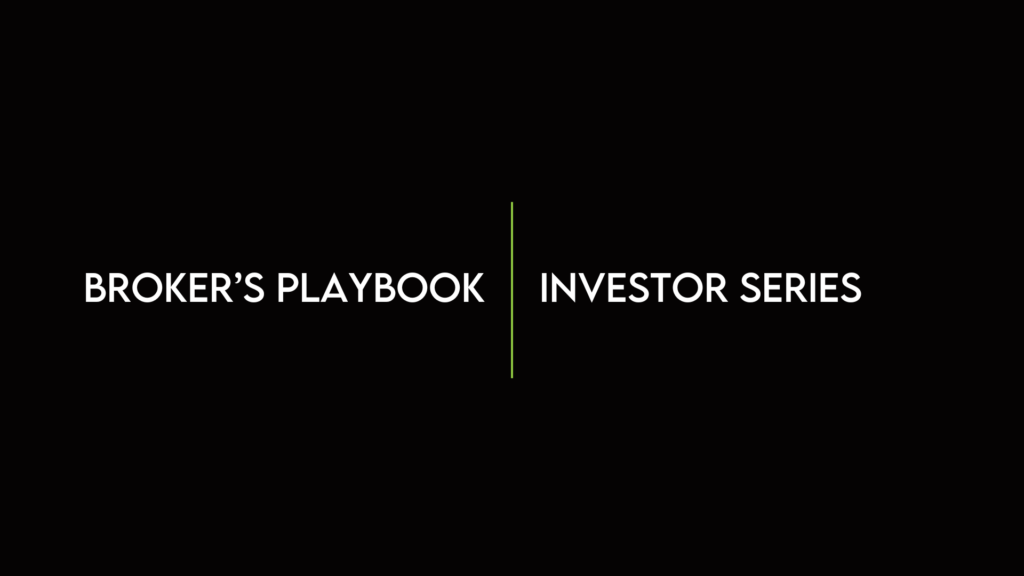
In this episode of the Broker’s Playbook podcast, we’ll show you how mortgage broker Lucy Biocca has been growing his business through referrals for the past 11 years. Learn how Lucy meets the unique needs of each relationship while providing a smooth and easy referral process. Get insider tips on the best ways to build and maintain meaningful relationships with clients. Watch now to discover why Lucy believes referrals are key to success in real estate.
Simeon Papailias: All right. To my brothers and sisters in the business. Welcome to yet another. This episode of Broker’s Playbook podcast today. I have a new friend, a new strategic partner, somebody who I believe we’re going to be working together for a long time. So it is an episode where I’m bringing someone that I feel brings value to the industry. And her name is Lucy Bjelke. She’s a mortgage broker. She’s part of today’s mortgage choice, the DLC group of companies. And she’s an 11-year veteran in the business. I had lunch with her about a month ago out in Burlington, Ontario, and we really, really connected with each other on more than just, you know, hi, I’m a mortgage broker on my agent. How can we do some deals together? It seems like a lot of the values that I have in the business and what I’m trying to do is something that she’s been doing and strives to do Furthermore, in her in her future business dealings and her future personal dealings. Lucy Biocca, welcome to the show. It’s our pleasure and honor to have you share your insights with us, as always. And as a reminder, the whole point of the Brokers Playbook podcast excuse me, is to elevate the game. I want you to share the insights that have made you successful. I want you to share the insights that potentially brought you two steps back because they’re as important as as the ones that brought you forward. Absolutely. They are. Every L, as I like to call it, is a lesson, not a loss. And every time we get either held back or misstep, we just know what to look out for the next time. Let’s start from scratch. Tell me a little bit about how you got to mortgage brokering and of course where you are today.
Lucy Biocca: So I started brokering 11 years ago, actually. And what led me to brokering was my, we’ll say, my past experience with banking. I climb the corporate ladder. And then I just decided that working for the bank was not it was not the direction I wanted to stay and it wasn’t the direction I wanted to stay because there’s that corporate environment where. I just didn’t feel like I could be myself. I wasn’t. Well, you’re not yourself.
Simeon Papailias: You’re not yourself in a corporate environment. You have to assume whatever identity the corporation strives for or the culture that they are in. So it’s not for everyone. There’s nothing wrong with it. But it’s not for everyone.
Lucy Biocca: No. And it wasn’t for me. You know, you have to you’re stuck in this square box. And quite truthfully, I became very, very tired of declining people for something, whether it was a mortgage or a credit card or a loan, when truly I didn’t believe that the client should have been declined. I believe the bank didn’t have a product for them.
Simeon Papailias: Isn’t that interesting? As a broker. Mortgage brokers. Because I get asked all the time, like I meet with a client, I’m going to go to my bank, the red one or the green one, it doesn’t matter. And I’m going to see what they have to say to me. And I always have to like say, Yo, let’s take it one step at a time. Going to the bank that you’ve used for the last 20 years may not be the best option right now. Have you spoken to a professional who whose only function is to find the appropriate product for your circumstance? Exactly. Tell me a little bit about what defines. So this is a real estate agent and a mortgage broker podcast. You’re not the first broker to be on course. You won’t be the last. But to you, what really defines your actual job? What’s the jobbing of mortgage brokering? Above and beyond the entrepreneurial, the assistance. What is the actual function? When we say finding the right product for the right person?
Lucy Biocca: It’s understanding what the client needs. It’s understanding and I mean truly understanding. I don’t mean this is what the client circumstance is right now. Where are they going to be in two, three, five, ten years from now? And of course, that’s a long time. Nobody knows that. But have a conversation with them.
Simeon Papailias: Like, what is their goal?
Lucy Biocca: Understand? Understand what their goals are. Um, have a conversation with the realtor. Okay. I have tons of referral partners. I love working with referral partners and realtors, and I’ll tell you why. Because my job, truthfully, is to make sure that your deal closes. My job is to make sure you get paid and that client is happy and you look like a rock star on so many levels with that client. So to me. A partnership is what? We should be. You need to use me for or in my opinion, you should use me for how you can get your deal closed. And sometimes it’s outside the box and sometimes it’s, Oh, this is triple A, everything’s great, easy peasy, easy peasy. And even the easy peasy ones nowadays are not so easy peasy.
Simeon Papailias: I think I’m going to take you back to one thing that you said and the one thing that you said is understanding what really the client is about and having that conversation. As an investment focused realtor, which I am. I’m a commercial broker. I’m an investment broker. But even to any residential broker, brand new. 10 or 20 years experience. It’s irrelevant. Unless you understand your client’s plan, you cannot service them. And that starts with the house. It starts with the investment. It starts with the mortgage. It’s the whole thing. So if anybody’s wondering what Lucy is implying by understanding, how can I do my job if I don’t understand? What the goal here is. Absolutely, because it’s easy to close a deal. But if Simeon the client. So if I was a client and I had to close on a condo or a duplex and I came to you and said, give me a mortgage for this duplex. Okay, here’s a mortgage for this duplex. But if you now stonewalled me, tied up all my resources, used all my covenants, any personal guarantees, any net worth statements, I’m now landlocked for the term of this mortgage.
Simeon Papailias: Or further, because I should have had a private mortgage that allows me to buy a second and third property. The interest rate might be higher. All the different variables that go into deal structure. But you would know. You would not know that unless either the agent or the client themselves opened up the conversation properly. Absolutely. So with that said, where does the responsibility of the agent start when they are referring a piece of business? So you’re not this isn’t your first rodeo. So you’ve been at this for 11 years. You’ve closed hundreds of deals. Let’s talk a little bit about practical and tactical. I want to start a brand new relationship with Lucy Bianca for you to be my go to mortgage broker. Okay. How what advice do you have to give to me, whether I’m new or intermediate or senior? How do you want to see referrals come in where you can say, you give me this type of referral in and I will give you the ultimate client experience? How do you like to see referrals come in? And because the way you will say this will be 99.9% of seasoned mortgage brokers.
Lucy Biocca: It might be 99.9%.
Simeon Papailias: I take it back. You are far superior than most. Let’s go. How do you like it?
Lucy Biocca: I’m going to be honest with you. I want to get to know you. The referral, the referring agent. I want to know how you want to send me. The. I want to know how you communicate. How do you like to send off deals? How much volume do you have on your plate? Do you have time to go through? You know, write me a two page email on this client. No, you don’t. So each relationship is going to be slightly different. I have a process that I follow. However, that the initial part of a referral is not going to be based on how I want to see it. It’s going to be based on how it makes your life easier. If it makes your life easier where you say, You send me a text message. Lucy I’ve got John Smith. This is what he’s looking for. This is the relationship we have. Here’s his phone number and his email address. Take it away. I’m good with that. If you want to send me an email that says A, B, C, and D, this is what we’ve done. This is how we want to move forward. I’m all for that. But at the end of the day, as a mortgage broker, it’s my job to get the information and build the relationship with the client. You’re building your relationship. We’ve built our. Sorry. You’re building your relationship with the client. You and I have, theoretically, in most cases, already built our relationship together. We understand how we work.
Simeon Papailias: And how we complement each other.
Lucy Biocca: Exactly. Okay. And now it’s my job to talk to the client. It’s my job to understand my part of what the client needs. Yes, I have to ask the client questions. Okay. Now I’ve got tons of different referral partners. Some text, some email. Some just give me a call and say, Hey, take this guy’s number down and I’m fine with that. But at the end of the day. Before you’ve even referred somebody to me, or vice versa for that matter, because obviously I’m going to make referrals to you as well at the end of the day. We already have an understanding of how you and I work, will work together and what type of clients you have and what my expertise are. So that that’s part of the relationship. Part of it. In all honesty, if you don’t have a relationship with a mortgage broker. It doesn’t matter what a mortgage broker knows. Or a realtor knows as long as they find the resources. My favourite line in this business is honestly there. It’s not. There’s never a lack of resources. There’s a lack of resourcefulness.
Simeon Papailias: No doubt about it.
Lucy Biocca: So if you have the resources, you won’t have a problem as a mortgage broker. And you’ll be adaptable enough to understand what resources you need right away.
Simeon Papailias: Well, and in some cases, it’s not so clear. So I think what’s coming out of this and it’s very simple because there’s going to be people watching and listening to this that just got their real estate or mortgage license. And there’s going to be people who listen to this that have been at it for longer than I have, which is 15 years, that are on their 20th or 25th year. The whole point of the exercise. In my opinion, what I’ve learned out of this business, any fake person, anybody who’s faking it till they make it and pretending and all the things you will get snuffed out in this market, in this specifically to make sure we date this April, May 2023, that we’re seeing a small rebound out of the worst record in over ten years being February 20th, 22 to February 2023 with eight interest rate increases that scared the daylights out of an entire country and put them into hiding. And now we’re slowly snuffing the the the market activity back out. And we’re doing so with education. If you if you just started and you simply don’t know what I just said, does it make sense to you? It’s fine. It happens. We all started somewhere. I started in a cool year that was oh seven, oh eight, oh nine were my first years in real estate. And guess what? The Lehman Brothers had just gone bankrupt. The world. Had a little accident in their pants. The entire world at the time had an accident in their pants. But luckily, within six months, one year, as we always see, humans like to forget trauma and move on with positivity in the market progressed and all the things happening. Here we are 15 years later to talk about it and celebrate life with a successful career if you’re just starting in real estate or a mortgage broker. You’re speaking to a client. What do you say if you don’t if the client asks you a question and you don’t know the answer. What is the right thing to say as a brand new mortgage agent?
Lucy Biocca: That is a very interesting question, is what I would say. I don’t have the answer right now, but I will get it for you. And that’s what you see.
Simeon Papailias: That, my friends, is exactly verbatim what anyone should say when they don’t have the answer to any question, be it simple or complex. Yes, that is an interesting question because you are acknowledging the question they answered. They asked you. You know, you do not know the answer. And instead of weaving up nonsense, you will be humble.
Lucy Biocca: Yes.
Simeon Papailias: Patient. And prudent enough. To get back to them with the appropriate information.
Lucy Biocca: I’d like to add one word to those three words, please. Transparent? Yes. If you’re not transparent in this business, that’s a big problem.
Simeon Papailias: It’s a big well, it’s a big problem in anything.
Lucy Biocca: It’s a big problem in any it’s a big problem in anything. This really is a person’s livelihood. How many people have the opportunity to own.
Simeon Papailias: More than one of your actions? Yes. Is somebody who’s going to pay for it for the rest of their lives? Yes. So?
Lucy Biocca: So 100%.
Simeon Papailias: So the stakes are high. Very high. And I like to acknowledge that because we after doing this for a while, you do get complacent with the fact that, oh, that was just a $700,000 transaction, not a $2 million transaction. When is the last time you lost 700 K or were jeopardized or put in a pickle with 700 K being the roundup error?
Lucy Biocca: And we had a conversation, you and I, just a few moments ago, not necessarily on the podcast right now, but we talked about. What makes a good realtor? What makes a good mortgage broker? Its commitment. I have to be as your mortgage broker, I have to be committed to you. I have to be committed to the transaction. But first and foremost, there are people. Normal everyday people that work their whole life to pay off a mortgage, to own a home, to give their kids something after they’re no longer here, their legacy, whatever you want to call it, they are people. And it doesn’t matter how important. 100,000 or $1000 or $1 million or $100 million is to us. That’s everything to them. And there’s people at the end of the day.
Simeon Papailias: So it is always fascinating to put it into context because I personally do that all the time because I overlook a team of 60 agents. So I’m looking at six, seven, 800 transactions a year. And does your eye and mind sometimes get numb to the numbers? Do you sometimes feel like. This is quick. Okay, This is simple. This is a little one. What’s a little one? Stop yourself, too. Who is it? Little. 100% was that transaction fee. Little to me, because that was somebody’s life’s aspiration, their life’s work. So putting it into context and always trying to stay kind of in the moment, humble in the transaction level is important. Lucy We talked about commitment, loyalty, service to client 2023. We have seen the rise of teams across the entire industry. Mortgage agents included. Why do you feel this overwhelming amount of data that is readily available to everyone? This was supposed to free the consumer when data started coming out and everybody’s like, No, no, everything’s accessible to me. There is now a lot, maybe too much accessible to everyone where the ability to decipher, properly analyze and make a solid decision is harder than ever. Is that what it is? Because that’s the way I see it.
Lucy Biocca: That’s exactly the way it is in my opinion. Okay. A data is everywhere, but where are you getting it from?
Simeon Papailias: So which data do you use and for what purpose? Exactly.
Lucy Biocca: Okay, So as a consumer and I deal with tons of first time homebuyers as well. Well, I read this online. And I read this online.
Simeon Papailias: And they contradict each other.
Lucy Biocca: And they contradict each other. And I don’t understand. And my kids are prime examples of this. My daughter messages me every once in a while and says, Mom, is this something I can do? And it’s I mean, it could be anything. It could be something, you know, something that pertains to mortgages in the States. We can’t differentiate in most cases. Most consumers out there are not differentiating if it’s a Canadian market or a US market or if it’s an Australian market.
Simeon Papailias: And what does that mean exactly?
Lucy Biocca: And beyond that, at this point in time, and especially in this market. And again, you and I have talked about this before. We need to understand each and every single client we’re working with. There could be one tiny little nuance about their individual circumstance that brings them from an a file. When I say a an a file, I mean your your typical triple A and it could be something they think is so minute. But that particular matter or that particular factor brings them to a private. So they think they’re going to get a 5%, four and a half, 5% interest rate when if they have 20% down, they’re going to get a 10% interest rate. Right. You need to and, of course.
Simeon Papailias: The ability to be able to interpret and explain why and how that happens exactly in a way that doesn’t jeopardize the realtor relationship. Absolutely. In a way that doesn’t deflate the client directly to a point where they put their dream of home ownership and or real estate investment on hold indefinitely.
Lucy Biocca: And again, we have this culture that has been encouraged. I’m not here to bash banks. I work with banks. Yes, all day, all day. So banks have their place. But and I can honestly tell you this because I used to be a banker and I understand the mindset of being a banker and what’s we’ve or the bank and the. Standard institutions have fostered this environment of. If we don’t have a product for you. The problem is yours, not ours.
Simeon Papailias: Or you’re the problem.
Lucy Biocca: Or you are the problem, not us. That is not the case. That is absolutely not the case.
Simeon Papailias: And that is 99.9% ignorance by both the agent, the consumer, and or the banker at hand. Absolutely. For not having product knowledge outside of the realm of their own ecosystem.
Lucy Biocca: Absolutely. And then you get mortgage brokers and mortgage agents who don’t understand be lending. And it’s just because they do mostly a And that’s okay. But the importance of finding that resource and finding that mortgage broker or mortgage agent that has access to and understands be lenders. And we’re not just talking one lender, we’re talking five, six, seven lenders, seven be lenders eight. If you can give me.
Simeon Papailias: An example of just some company names that are active lenders in the Canadian marketplace right now.
Lucy Biocca: Home Trust, Equitable Bank CW, Canadian Western Bank, which is optimum mortgages. Who else do I deal with first? National Excalibur. Mcap Eclipse. Those are the ones that off the top of my head.
Simeon Papailias: And I’ll just stop you off the top of your head. You named seven eight institutions that I would imagine If I were to ask you a follow up question as give me the head of the division that you speak to at each one of you would know them by first and last name basis. You’ve done deals with them. Et cetera. This speaks to an 11 year track record.
Lucy Biocca: Do you know what what else it speaks to? I’m just going to say please. When I first started, I love realtors. I do. I love the environment. I love I love what realtors have created for themselves in terms of a community. But you and I both know that when you’re a new mortgage agent or you’re a mortgage agent and you want to work with a certain realtor, guess what they’re going to give you first?
Simeon Papailias: Are worse files ever.
Lucy Biocca: Exactly. Of course. Of course. So that’s me. Prove yourself. Exactly. Prove yourself. That is 11 years of me saying. That is a very interesting question. Yes. I’m going to find out and I’m going to get back to you.
Simeon Papailias: It’s interesting when I was because I come from the receivables business contingency in third party, it’s collections where people are like, I work for Amex and for CIBC small business portfolios, where I called small business owners to say, Hi Lucy, you’re a small business owner. You own the hardwood store in Erin, Ontario. Your Amex bill. It’s 42,000. You’re supposed to pay the charge card every month. Your business charge card. What happened? Lucy says, listen, you know, the economy. This is what’s going down. I have to pay payroll. I’m going to have everything to you by the 15th of the month, 90% of the time. Lucy paid it, but there was 10% of the time where Lucy didn’t. From the people that went into second, third and fourth month and eventually into default. The common denominator was one thing. The people who got saved owned real estate and refinanced it. The people who got hung out to dry and eventually they filed for bankruptcy protection or consumer proposals or all the different things for the people who didn’t own real estate. For every. Person out there, every civilian non real estate agent, mortgage broker for every brand new real estate agent. Mortgage broker. What is the absolute value? Of a mortgage agent. I want you to define it. Crystal clear. In the second follow up question is the difference of the said description at year one and year ten. So who were you a year one and what has changed? At Lucy at year 11. So what is a perfect mortgage broker and the difference from year one to year ten?
Lucy Biocca: So I’m going to start with your difference from year one to year ten. First, if you don’t mind. I’m going to flip that.
Simeon Papailias: But the reason I say this is because I told you what you’re solving for business owner. Our school principal that got divorced could have been a million different things. So whether they’re self employed and failing, they need help. They own a property. They want to get saved. If they reach out to Lucy at year one, they reached out. What is the perfect description of a mortgage agent? Why do they call you in the first place? And then I want the difference between Lucy year one and Lucy year ten. Okay.
Lucy Biocca: What that client needs, regardless of whether they’re a principal or they are, you know, a business that is, you know, they own a business that’s not doing as well as they anticipated. The first thing that they need. Is they need somebody to hear them. Listen. Without responding. Listen without judgment. And be able to ask them. Why are we here today? And what do you need from me? Most of the time they don’t know. But when you pose a question. To a client and they don’t know how to answer it. That’s when you start to learn things about them because they’re looking for answers and they don’t necessarily know that they’re answering properly. But in order for them to be able to answer any question, they need to feel comfortable with you. You need to be a sounding board without judgement. You have to know as much as you can.
Lucy Biocca: But.
Lucy Biocca: You have to make them feel like. Isn’t it.
Simeon Papailias: Humble? Isn’t it amazing? Is it amazing that you’re identifying if I just got introduced to a stranger? In IM and probably the either my darkest hour or pretty damn close to. I’m reaching out to a mortgage broker because I was told that this person can help me. There is no way that that feels good. Exactly. So off the bat, the client, the consumer. Who’s reaching out for a.
Lucy Biocca: Life lifeline or help or whatever.
Simeon Papailias: Is already at a dynamic that they are on the receiving end, not the giving end. Most professionals, unfortunately, and I’m sure every single person listening can resonate with it. Most professionals. I’m the big bad banker. Tell me about how you got into this mess and what can you do to fix it as opposed to listening exactly what you were saying. I personally deploy the strategy that I heard from my mentor, my late partner, Simon, and that is he would ask people and in return, I ask people his legacy lives on. Is Lucy if you had a magic wand? Anything is possible. Tell me what’s in your mind right now. What would this solution look like right now? And they’re going to go off. Into their amazing minds and describe the circumstances, whether realistic or unrealistic. So now I know what you know. So they’ll tell me and slowly open up as to if life was perfect and my partner didn’t pass away two years ago and my kids off to whatever and all the millions of things that happen to people, I would be sitting here on my porch with a million bucks. Et cetera. Mice. Subsequent question is So what resources do we have to even attempt getting there?
Lucy Biocca: Exactly.
Simeon Papailias: Slowly. Again, they open up and they’re going to speak to I lost my home, but my cousin lives next door. My mother. My father. The Pope. Doesn’t matter. The approach of listening, active, listening and empathy has served me well.
Lucy Biocca: Me too.
Simeon Papailias: Is empathy a key to doing business in 2023? There’s a lot of people say process and systems or is there a place for both?
Lucy Biocca: There’s definitely a place for both. Absolutely a place for both. But if there’s no empathy, there’s a transaction. That’s it. There’s one transaction. There’s no relationship. Um, you know, and I go back to this because there was a particular time in my career where I moved on to a brokerage as a, um, let’s put it this way, took over $100 million business. It was about 100 million and it everything became transactional. And it’s really easy to lose focus that there’s a person on the back of that transaction. And. It didn’t work for me. I didn’t want it. I was miserable. At that point that I think that was like six years ago or something like that. So halfway, halfway. I didn’t have as a broker. I didn’t have the resources in place to be able to handle both the relationship and the volume. Okay. But I’m going off on a different tangent. But with that being said. You have to find what’s important to you. And again, why are you doing this? I love people I sincerely want to see. A transaction. Finish. I want to see a transaction finished because I love to see clients. I love to see first time homebuyers get into a home, and I’ve made a little bit of a difference in that.
Simeon Papailias: Yeah, you’re part of their story.
Lucy Biocca: Exactly. I love having referral partners and we’ll touch on the difference between a a referral source and a referral partner. Okay. I love it when I was a part of a transaction. That helped Simeon get paid. That helped Simeon take his family on vacation or whatever. Your why is so. At the end of the day. It’s it’s all people. You’re going to put infrastructure in place. You’re going to you’re going to do a whole bunch of different things and you’re going to try until you got it. But the one thing.
Simeon Papailias: It’s so difficult and I have to and I’m going to interject only because it’s so difficult to keep a conversation like this on a single track. It really it really is. It really is. But I think we have a perfect definition of what a good mortgage broker is through at least ten examples of context. And that is an active listener with empathy, that is interested in seeing somebody win. You also explained your why, which is you love people. You want to be a part of their story. I just want to finish the thought of Lucy at year one and Lucy at year 11. Do you think you were as relevant, as connected, as experienced? The it’s an obvious answer. It’s a rhetorical question. But I want you to explain to me from your journey, how did you feel or where do you feel your why was in your mind was versus where it is today?
Lucy Biocca: At year one. It was about getting that deal. It was about that one deal. I have to learn how to get the client. And of course, as a mortgage agent, when you first start, everybody tells you, oh, you’ve got to go to realtors. What you don’t realize is how are you going to build that relationship with the realtors? So at the beginning, it’s, I need a deal because I have to pay my rent or I have to pay my mortgage. At year 11. You understand what works and what doesn’t work for you individually. I guarantee if you have another mortgage broker come in here, they’re going to have a different story. They’re going to have a different why? They’re going to have a different way of going about getting to where I am at right now. Okay. So my way at year one was I got to find a deal. I got to pay bills at year 11. It’s I’ve tried everything that I can think of. I know what I’m good at. I know what I’m not good at. I look at my business and I can say, how do I add value to Simeon Papalia’s business? I’m sorry, I hope I said your name right.
Simeon Papailias: Close enough.
Lucy Biocca: I’m sorry. We’re still making.
Simeon Papailias: A t shirt with all the variations.
Lucy Biocca: Oh, I need one part of it. You’ll probably need one. How do I add value to your business? And that. How do I add value becomes what does my how do. Sorry. What infrastructure do I have in place that allows me to build the relationship that Simeon is looking for? And there are a lot of new agents out there that have tremendous potential, both in real estate, both in mortgage brokering. But I’m going to be honest with you. Those new agents need a mentor. And a mentor that is going to say, Look, buddy, I love you. I know you’re discouraged. Can I use a little bit of a word that I. Yes, you may.
Simeon Papailias: Yes, you may get.
Lucy Biocca: Off your ass and do this. Yes. And if you don’t, I know that that’s what I needed. Okay. Six I want to say six years ago. No, it’s longer than that. Anyways when I was. I have a particular mentor, Roy. Okay. When I went into his brokerage, I was underwriting for him. I was also doing my own business. I think I was two and a half, three years in. And. I didn’t know what I didn’t know. But I knew that I didn’t know. And so I had to take a step back and actually say, is this ego of mine? Going to hold me back because I don’t know what I don’t know. Or am I going to take a step back and say, I got I got to do something differently? Because if I don’t do something differently right now, I’m making this harder for myself. And if I’m making it harder for myself, I’m making it harder for my kids. So you step back. And I said I got to learn. So I joined. Roy as his underwriter. And as a separate agent. And I want to say, I don’t know, less than a year later. Maybe a year, a year and a half.
Simeon Papailias: Later, a different person.
Lucy Biocca: Oh, not only did I come out of a different person. Again. There’s always that fear as a single mom. You know, am I going to make it out on my own? You have a little nest egg there. Comfort. Comfort. Until Roy came.
Simeon Papailias: To me is one of the most dangerous things on the.
Lucy Biocca: Planet. Exactly. And Roy came to me and he said. You got to go out on your own. And we still have a wonderful relationship. This guy is just I love him to pieces. Well, there’s a reason like a brother.
Simeon Papailias: There’s a reason he had this kind of impact on you. Exactly.
Lucy Biocca: Yeah. And so he said you got to go out on your own. You’re ready.
Simeon Papailias: An enabler. He’s an enabler. He enables success.
Lucy Biocca: Yes, he absolutely did enable my success. He was he was a part of it. So there’s other people. But Roy came to me and he said, Give me a date. And I said, Roy, I’m not ready. He goes, Yeah, you are. You’re ready? And I said, No, I’m not. And he looked at me and he goes, This is kind of relationship we had. He goes, Don’t make me fire you. And I looked at him and I said, I’m too damn good. You won’t fire me. And he looked back at me and he goes, Yeah, you’re good. That’s why you got to do this. Was I ever afraid? Sure. Single mom, No. Safety net. And I looked at him and I said, I’ve never been fired in my life. You’re not going to be the first. So June 1st, Actually, no. Yes. I said June 1st. And then on June 1st I said, listen, I can’t make any changes. I’m so busy. You’re so busy. This is not the right time. He goes, okay, what’s your date? I said, November 1st. Well, November is by far the worst time to ever go out on your own, Simeon. I can see the look on your face. You’re like, Oh, boy. Yeah. And. November, December, January. I cry when I get overwhelmed, but I don’t cry because I don’t feel like I can do something. I cry when I get overwhelmed. I was crying because I didn’t know what the hell I did. And then it was. You’re taking a step back or you’re taking it or you’re leaping forward. Yeah, everybody needs that Roy in their life. Every every new agent needs that.
Simeon Papailias: Well, I think that’s that’s a universal truth. I think that truth is ringing harder, faster and louder as the years go by because the world is becoming more complex and faster in the way it does business today than more than ever with the rise of. Apps technology enabling the journey half the journey. Prop techs bringing in different solutions at different stages of the game. And still we have to make sense of it all. If a client has invested in a technology that helps them get halfway through their home selling journey and they call me tomorrow and say, Well, I messed it all up, this doesn’t work, fix it. I still have to go do some active listening with empathy. And figure out what the solution is and actually deliver a solution. Involve Lucy or. Your Lucy and your market. Figure out the solution and get the job done. My advice is very simple. Two new agents and this is not a knock at whether you can do it or you can do it. This is not a knock at all because I was a new agent, too. Lucy was a new agent too.
Simeon Papailias: So nobody is pompous or sitting on a high horse telling you what you can or cannot do. But I will tell you that no matter how able. How amazing. How your results right now are working. You simply have not experienced the closing of 1000, 2000, 5000 properties. Absolutely. The way I or someone who looks just like me or just like you has experience cannot be bought or bargained for. But you can always count on the best people in this business and in any business to be the ones who share the most. The more successful someone truly is, the more you will see that they are happy to share the lessons, the losses, which are lessons and the wins and the triumphs and how to make. I have had 90 year old men tell me a story from their day that is not only relevant to today, it’s those are universal truths. People have always hurt people. People have always helped people. And that will never change. So as a new agent. What is the best thing they can do or give back to promote mentorship? How does one go find a mentor?
Lucy Biocca: Lucy I think you’re going to go find a mentor the same way that you’re going to go and find a deal. The same way You’re going to go and find a friend. You’re going to put yourself out there. You’re going to talk to people. I think. One of the I know one of the things that I was hardest on myself about through this whole journey of, you know, from one year to year 11 was. I didn’t give myself grace when I made a mistake, because the reality is we are going to have wins and we are going to have learning opportunities. Okay. And we need to be self-aware enough. To understand this was a learning opportunity. And it may have come through a financial loss. It may have come through losing a client or a referral partner or something. But be aware that. Yeah, this is not the best way to do things. And how can I do this better? And if you don’t know or if I don’t know. Then you need to get on that phone or you need to go into your office and you need to have somebody to ask. Yes. Everybody needs a mentor. I was afraid to ask questions when I first started. My first two, two and a half years were a disaster. I didn’t know how to hustle for business. I just know I needed it. Okay. Where do I start?
Simeon Papailias: What does hustling actually mean exactly?
Lucy Biocca: Does it mean sitting on my computer all day long working on a marketing piece or a social media? No, it doesn’t. What I learned again from year one to year 11 is I don’t like doing everything. But I’m good at doing. Some things. And those things that I’m really good at doing. Are the things that I need to do more of. And then there’s always that one thing that. Allows me to step outside of my comfort zone.
Lucy Biocca: And do it.
Simeon Papailias: And that’s how you grow and.
Lucy Biocca: Do it again. And then do it again.
Lucy Biocca: And that’s how you grow. You know, the first time I had a team, a couple of team members. Oh, my God. I was a horrible leader. I was a manager. That’s that’s not what a good.
Lucy Biocca: That’s not what makes a good team.
Simeon Papailias: Leader. Well, a leader and a manager are two different things.
Lucy Biocca: Exactly. But I didn’t realize the difference at the time.
Lucy Biocca: Right. So what happens.
Lucy Biocca: There was severe disconnect. Serious disconnect. I was not.
Lucy Biocca: The right leader for them.
Lucy Biocca: I just wasn’t, am I now? I think so.
Simeon Papailias: You hope so?
Lucy Biocca: Absolutely.
Simeon Papailias: It’s a work in progress.
Lucy Biocca: It’s always it’s.
Lucy Biocca: Always a work in progress.
Simeon Papailias: Because leadership involves culture. Culture is not something that can be bought. It’s not. It’s intangible. Absolutely. It’s a feeling. It’s the way somebody is inspired. A leader inspires. A manager manages. Exactly.
Lucy Biocca: So it was a great manager when I was managing, you.
Lucy Biocca: Know, previously with. But that’s managing exactly that.
Lucy Biocca: Is just an example for me. You know, over the years of know what’s the difference between 1 and 11. I like that’s that’s the difference between 1 and 1.
Simeon Papailias: A really good job in covering a lot of the advice to new mortgage agents. It’s the same advice to new real estate agents. Precisely. Actually change the word mortgage leave agent. It’s one in the exact same because we’re solving for the same problems together. But earlier you mentioned. How does Lucy? Work with Simeon and you said, It’s my job to look within my infrastructure to find a value proposition that Simeon can plug into or else I don’t have anything. I think for any agent, because I’m not going to say mortgage or real estate at this point. I know it’s one or the it doesn’t matter. Let’s move on to the intermediates and seniors. You are an intelligent and prudent enough businesswoman to know that unless you have a value prop, I can even look at you for the purposes of business. And why is that? Because you’re already coming in here knowing that I have a significant machine. So like any senior agent, whether in mortgage or in real estate, whether you’re solo or in a team, if you’re in it for 11 years and you’re doing X, Y, Z amount, it doesn’t matter what you’re doing. There’s an infrastructure and a process. Whether you have a link up at the local legion, the cop shop, the hospital, somebody’s feeding you business. Some you turned on a source and a tap and you have a viable amazing. Beneficial. Business. If you have a team, you have a team. If you’re solo, you’re solo, but you have your own processes. We know there’s a difference between a referral partner and a mortgage partner, for that matter, versus a referral source. Sources where the business comes from. A partner is how we close and grow. Yes. Relationship. Transaction.
Lucy Biocca: Yes.
Simeon Papailias: If I hear one more broker offer me 30 points on the dollar, 40 points on the dollar, 50 points on the dollar, it doesn’t matter how far you can drop your pants for me. I have zero interest in you because you can’t buy my trust. In my client. I actually haven’t received me personally, I can’t speak for anyone else and there is no wrong answer. You run your businesses as you see fit.
Lucy Biocca: Yeah, I agree.
Simeon Papailias: But I personally haven’t received a mortgage referral cheque in the last 12 of my 15 years. 1215. Because I understood the value of the mortgage broker who will actually take the time to close my business. Yes. Will be the same broker that feeds my funnels with actual transactions where the commission is worth 15 mortgage referrals.
Lucy Biocca: Can I tell you how many? Yes, please. How many referral fees I’ve paid. Can you guess?
Lucy Biocca: None. Exactly.
Lucy Biocca: And it’s not because I’m not willing to. Happy?
Lucy Biocca: Absolutely.
Lucy Biocca: You want 20 points? Fine. Sure. But at the end of the day.
Simeon Papailias: What’s it for?
Lucy Biocca: If that is the value that you see. In our relationship. First of all, we don’t have a relationship. If that’s all the value that you see in me. I’ve done something seriously wrong because I truly have a lot more to bring my team and I have a lot more to bring. To a transaction, then 20 basis points. I want to know you. I want to know how you do things, Why you do things. I want to be there with you in the trenches.
Simeon Papailias: So I want to make something very clear to everybody so you don’t misconstrue it. I actually got into real estate. Into real estate itself, in a way of when I worked for American Express and CIBC. Just for people to understand the story and not think there’s hypocrisy here because mortgage broker referral checks is how I actually ran into the business. I worked for Amex and CIBC, and then I would speak to Lucy, the business owner. Hardware store up north. She owns a home. I’m like, Lucy, I heard that you might be able to refinance because I’m listening to the senior agents at Amex and CIBC speak to their client. You mind if I introduce you to a broker? So, like, no problem. Save me. Simeon Yep. Because I listened. I was empathetic. I have a strategic business mind myself. I would make a referral and I would get. Within six months. Of my first referral check. My referral checks were more than my pay, which is a six figure job in banking, I suppose. Call it contingency call it recovery Small business portfolio. So I discovered a sleeping giant sitting beside me that people are willing to pay to source business. And I received tens of thousands of dollars over the years in that business. So. I’m not telling anyone by any means that a referral check is not worth its weight. Absolutely. All I’m saying is that in due course. And unless it happens in due course, then I will criticise you that you’re wrong. You have to go from transactional to relationship based if you ever want to own a business. If you don’t have relationships of trust and integrity that are founded on the principles of growth. The minute that you don’t give a referral, that person will never give you a referral. The minute that you don’t call them, they will stop calling you.
Lucy Biocca: There’s nothing wrong with a transaction based business.
Lucy Biocca: Simeon know nothing but.
Simeon Papailias: Know that that’s what it.
Lucy Biocca: Is.
Lucy Biocca: Exactly. And the way that I choose to run my business and what feeds my soul, to be honest with you, is the relationship. I’m not motivated by money in any way.
Simeon Papailias: So I know we don’t want to offend somebody who’s transactional. Absolutely. But on the same token, on a long term, and I can take slack for this if anybody wants to give it, unless you’re a sociopath, there’s only so long you can run a transaction only based business. There has to be a time where you need to feed your soul. There has to be a time where you’ve made enough money, you’ve done enough transactions, enough. Can I focus on a little bit more depth at this point? Again, I’m happy to argue this, but if you’re in the business ten years and you’re still only transactional, well, maybe there’s a there’s a problem. You may be in the wrong business. Like what? What feeds your soul.
Lucy Biocca: Because right now and see, I’m going to interject there for one quick second because. I feel like both of us have come into a place in our lives where the transaction is important. Don’t get me wrong, of course. And we have certain goals and places that we want to reach, but. We’ve gotten there.
Simeon Papailias: Yes. What’s more getting at.
Lucy Biocca: Yes.
Lucy Biocca: And that’s there’s not a problem with with. Transactional business. It just doesn’t feed me anymore. I’ve done that and it’s okay if it continues to feed somebody else. I do not want this to be, you know, I don’t want this to be misconstrued as judgment. All I’m saying is this is what feeds me, and this is why I do things at this point in time. Eight years ago, seven years ago, it was a different story. I needed.
Lucy Biocca: Transactions.
Simeon Papailias: No, And but that’s something we’ve said right off the start. There is different. And that’s why I asked, Where’s Lucy? Year one. Lucy. Year 11. Where is. How did Simeon get started? In the business? Where was Simeon? Year one. Where is Simeon? Year 15. Lucy. Year one. Lucy. Year 11. I want to bring this this podcast to a close. I want to have Lucy, if you may, please share with me your top three pieces of advice to anyone. Doesn’t have to be a mortgage broker, a real estate broker, a regular person listening to us. Where are you at in your life right now? What’s your top three pieces of advice? Okay. Business or life?
Lucy Biocca: The first one I’ve mentioned before is there’s never a lack of resources.
Lucy Biocca: There’s a lack of resourcefulness. If you want it, you will find it.
Lucy Biocca: If it’s important enough to you, you will find a way.
Lucy Biocca: You’ll make the time and you.
Lucy Biocca: Will make the time. You will find that resource. But it has to be really important to you. The second is make a commitment. Well, you know, I hear so many times. Well, you know, um, I don’t know. I’m going to try out mortgage brokering.
Simeon Papailias: Don’t try out.
Lucy Biocca: Don’t try anything.
Lucy Biocca: Do it. Or don’t. Yeah. If you’re in it, you’re in it. You can’t be in real estate or mortgage brokering half way. You can’t. And the third piece of advice is. Find the mentor and ask for help.
Lucy Biocca: Because you don’t know what you don’t know. And I don’t know what I don’t know.
Lucy Biocca: So those are the three things that I would say.
Simeon Papailias: I will say to mentorship, it’s year 15. I have a number of mentors active right this second, and I am an active mentor to a number of team members, friends and strategic partners. Mentorship is where I will leave my piece of advice today. Thank you, Lucy, for coming here. As a as a real estate veteran, as a mortgage professional, I truly appreciate your insight. Thank you. And I truly hope that every single one of my brothers and sisters in the business have found some of this insight helpful, inspirational. And of course, if you want to reach out to Lucy, all her information is in the descriptor on both our YouTube channels and on all the audio platforms. Lucy Biocca is out of Ontario. 11 year vet reached out to her directly for anything you may need. Until next time. We’ll see you soon.
Lucy Biocca: Thanks so much.
Simeon Papailias: Thank you so very much for spending your time with us here at Brokers Playbook. This is a growing community. If you found value in this video, please invite others to subscribe and of course, share the videos with them. We’ll see you soon.








